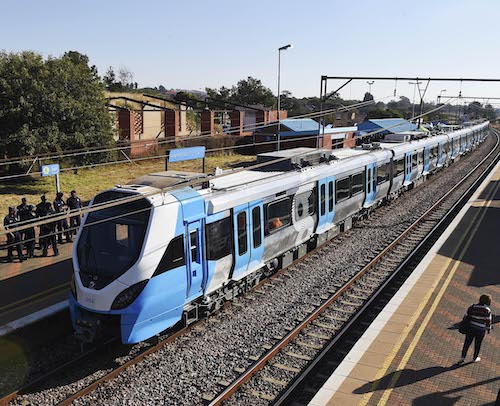Full steam ahead – new policy to transform South Africa’s rail sector

By Jessie Taylor
A new policy is set to introduce radical structural reforms to South Africa’s railway sector. South Africa’s railway plays an essential role in the economy, forming the backbone of the logistics and transport value chain. The sector is key to reviving the country’s economy and has been highlighted as integral to President Cyril Ramaphosa’s Economic Reconstruction and Recovery Plan.
The new White Paper on National Rail Policy looks to increase investment in this essential infrastructure, as well as prepare the sector to add to economic growth in the future.
A declining rail sector
The new White Paper on National Rail Policy was gazetted at the start of May and unpacks plans to develop the South African railway network, with private sector investment and effective economic regulation that enables equitable access to both the primary and secondary network.
The policy was approved by Cabinet in March, says Minister of Transport Fikile Mbalula.
“The release of the White Paper on National Rail Policy represents a new epoch and a decisive break with the past, which saw the railways being used as an instrument to segregate society and give credence to a system of racial oppression,” he says.
South Africa’s rail network has been operating for more than a century without a cohesive National Rail Policy. The lack of policy, as well as challenges over time, have lowered the efficiency of the system and limited its contribution to economic growth.
According to Minister Mbalula, a 1986 report that advocated against new rail investments, and the deregulation of the road sector in 1988, has pushed large portions of the rail industry into acute decline.
This gave rise to deferred maintenance of passenger rail assets, which resulted in the decline of commuter rail over the decades, with substandard service being provided in areas that predominantly serviced Africans.
“The obsolete state of much of the rail infrastructure and rolling stock, the limitations of narrow gauge and the underutilisation of the existing network presents only a few of the many challenges facing the rail sector. The National Rail Policy intends to place rail on a sound footing to play a meaningful role as a backbone of a seamlessly integrated transport value chain able to make a meaningful contribution to the economy,” said Minister Mbalula.
Building investment and infrastructure
The National Rail Policy sets out the government’s remedial interventions to position rail to contribute meaningfully to the country’s economy and reduce harmful greenhouse gas emissions. The White Paper looks to enable investment in railways, with a focus on heavy haul, heavy intermodal, and contemporary urban and regional rapid transit.
Some of the proposals in the White Paper include:
- Improved safety and security:
The Railway Safety Regulator will be encouraged to use new investments to implement modern safety technology, and all critical role players will ensure safety and security in both passenger and freight transport. The export of scrap metal may also be banned, to reduce cable theft.
“The criminality behind the rampant theft and vandalism of railway infrastructure that has stripped bare our stations and rail network requires extraordinary interventions that go beyond merely stepping up security. Theft and vandalism of critical rail infrastructure with the effect of disrupting economic activity constitute economic sabotage and should be treated as such by our courts of law,” said Minister Mbalula.
- Building local industry capacity:
The policy will boost manufacturing capacity in the industry, with a focus on the local production of steel and other rail supplies. This will be achieved by ensuring that the state and private operators procure all supplies from South African-based manufacturers. “The policy also encourages the entry of black, female, and young industrialists as local manufacturers, including through manufacturing joint ventures. A localisation strategy will be used to develop the industrial base for an active export strategy, particularly to other African countries. This will also support the Steel Master Plan of Government,” said Minister Mbalula.
- Increased rolling stock:
Rolling stock is essential to railway operations and is an integral part of the policy, with the government supporting freight and passenger train operators providing their own rolling stock as an additional funding source. Operators and state-owned enterprises (SOEs) can lease their rolling stock to any other party and encourage new entrants in the market.
- High-speed rail:
Central to the passenger rail reforms is the introduction of high-speed rail and the Department of Transport is developing a framework to prioritise high-speed rail corridors in South Africa. Feasibility studies on proposed high-speed rail services will be conducted by the Department guided by the framework.
- Skills development:
The White Paper also looks to increase skills development in the rail sector. The long-term plan is to establish an institution of higher learning specialising in rail engineering and operations.
Minister Mbalula adds that the White Paper introduces interventions that will open up the rail market to other operators to compete and improve operational efficiency.
“The policy places emphasis on improved rural access, increased mobility, increased job creation within the rail sector through infrastructure construction and contributes to economic development. Support to the agricultural, agro-processing and mining sectors will receive maximum traction with the implementation of the policy,” he says.
“In relation to passenger rail service, the policy seeks to address the capacity challenges, where PRASA cannot run services and introduces concessioning on other lines where private sector (sic) can operate services.”
Featuring in Public Sector Leaders is great for business. Find out more.
Sources:


.svg)












